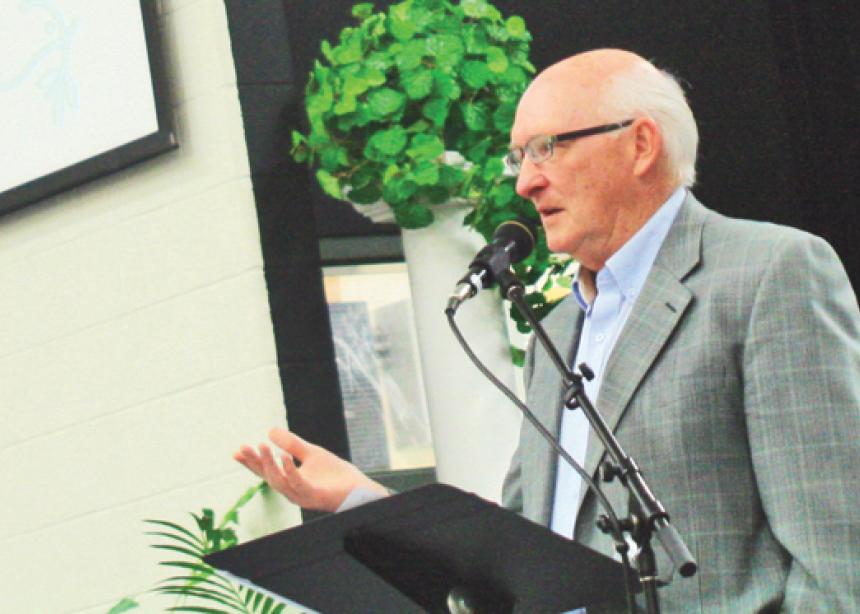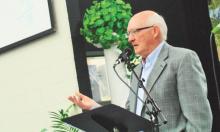After leading three study sessions on Colossians 3:15-17, the Bible theme text for Assembly 2010—Reclaiming Jesus: Gladly Wear the Name—retiring general secretary Robert J. Suderman found himself on the “hot seat.” He faced questions from three eager assembly “students” in a session facilitated by David Beltzer, instructor of communications and media at Canadian Mennonite University (CMU), Winnipeg, Man.
First up was Krista Loewen, a peace and conflict transformation studies student at CMU. She was intrigued by Suderman’s reference to the Roman Empire’s “colonization of imaginations” through Pax Romana (“peace obtained by the sword”). Suderman had noted that Christians need to colonize imaginations, too, but with gratitude reflective of biblical peace.
“How can we have a deeper sense of gratitude?” Loewen wondered.
“The deepest expression of gratitude is to dedicate your life, your passion, your gratitude and your gifts to building communities like this,” Suderman responded. He then challenged Loewen to take that message back with her to CMU.
Next at the microphone was Jim Loepp Thiessen, pastor of The Gathering Church in Kitchener, Ont. He described his congregation as “all over the theological grid in their perspectives on peace.” He then referred to Suderman’s comments about the World Religions Summit in Winnipeg in June, where keynote speaker Romeo Dallaire asserted that, because the United Nations chose not to intervene militarily in Rwanda in 1994, genocide took place.
Dallaire’s comment prompted Loepp Thiessen’s question: “What is a practical pacifist Christian response to Rwanda?”
“Close the door before the horses get out of the barn,” Suderman replied. “Most of the world’s response is to try and catch the horses after they’re out.” He relayed a comment former Cuban president Fidel Castro had once made to him: “If the church in Cuba would have been the church in 1959, the way the church was the church in 1980 in Nicaragua, there never would have been the Cuban Revolution.” In other words, build the church, Suderman said.
But what if the horses are already out of the barn? pressed Loepp Thiessen.
Suderman suggested that the church can still influence outcomes in regions of conflict through peaceful actions, such as advocating and exercising influence in political houses of leadership.
“I think you’ve hit the nail on the head,” Marco Funk, pastor of Gretna Bergthaler Mennonite Church, Man., said in regard to Suderman’s Bible study. “I like the language of letting the Word of Christ ‘dwell.’ I like the language of imperatives and non-negotiables. . . . I love that language, . . . but our context in southern Manitoba is one of landedness. We’re affluent; we love our stuff. We struggle with holistic allegiance. We really want to follow God.”
He invited Suderman to draw from his experiences travelling across Canada to visit Mennonite congregations. “What are we doing to deepen our allegiance? What are we doing to resist the [Roman] empire?”
Suderman replied, “Recently a pastor told us that he gets up in the morning energized and refreshed by the vision for the church in Ephesians and Colossians, and he’s ready to go for the day. He goes to bed realizing that he spent the day in Corinth working with people where [the church] isn’t yet working.” His advice: “Get up in the morning with Ephesus; go to bed at night with Corinth, and be grateful.”
With files from Donita Wiebe-Neufeld, Alberta correspondent for Canadian Mennonite.




Add new comment
Canadian Mennonite invites comments and encourages constructive discussion about our content. Actual full names (first and last) are required. Comments are moderated and may be edited. They will not appear online until approved and will be posted during business hours. Some comments may be reproduced in print.